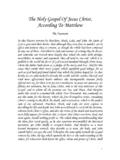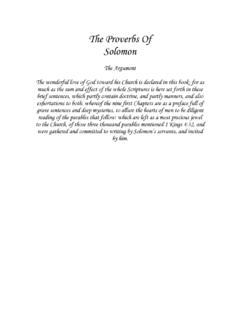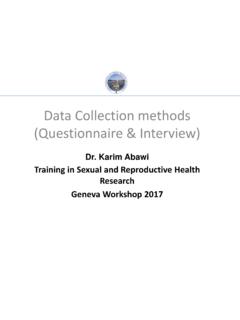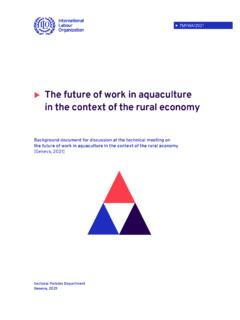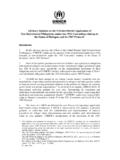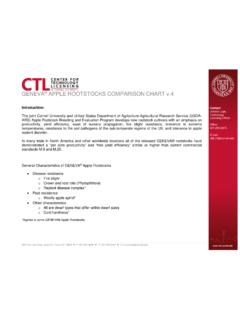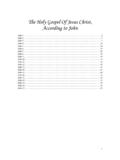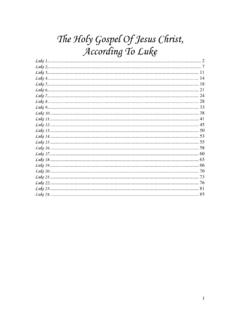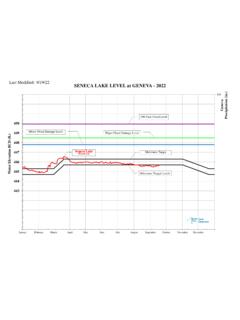Transcription of Defining sexual health - WHO
1 Defining sexual health Report of a technical sexual health document series consultation on sexual health 28 31 January 2002, geneva Defining sexual health Report of a technical consultation on sexual health 28 31 January 2002, geneva geneva , 2006. De ning sexual health : report of a technical consultation on sexual health , 28 31 January 2002, geneva world health organization 2006. All rights reserved. Publications of the world health organization can be obtained from WHO Press, world health Organiza- tion, 20 Avenue Appia, 1211 geneva 27, Switzerland (tel.: +41 22 791 3264; fax: +41 22 791 4857; e-mail: int). Requests for permission to reproduce or translate WHO publications whether for sale or for noncommercial distribution should be addressed to WHO Press, at the above address (fax: +41 22 791 4806; e-mail: The designations employed and the presentation of the material in this publication do not imply the expression of any opinion whatsoever on the part of the world health organization concerning the legal status of any country, territory, city or area or of its authorities, or concerning the delimitation of its frontiers or boundaries.)
2 Dotted lines on maps represent approximate border lines for which there may not yet be full agreement. The mention of speci c companies or of certain manufacturers' products does not imply that they are endorsed or recom- mended by the world health organization in preference to others of a similar nature that are not mentioned. Errors and omis- sions excepted, the names of proprietary products are distinguished by initial capital letters. All reasonable precautions have been taken by the world health organization to verify the information contained in this pub- lication. However, the published material is being distributed without warranty of any kind, either expressed or implied. The responsibility for the interpretation and use of the material lies with the reader. In no event shall the world health organization be liable for damages arising from its use.
3 This publication contains the collective views of an international group of experts and does not necessarily represent the deci- sions or the stated policy of the world health organization . Printed in Photo credits: Anita Kolmodin Contents Acknowledgements IV. Chapter 1: Introduction 1. Chapter 2: Purpose, objectives and overview of the consultation 2. Chapter 3: Working de nitions 4. Chapter 4: Building sexually healthy societies: the public health challenge 6. Healthy sexual development a gender issue 6. Discussion 8. The public health challenge 8. Chapter 5: Vulnerability and risk: in uencing factors 10. Models for addressing vulnerability and risk 10. Discussion 11. Regional perspectives on sociocultural factors 12. Latin America 12. Sub-Saharan Africa 13. Eastern Mediterranean region 13.
4 Asia 14. Discussion 14. Chapter 6: Meeting people's needs 15. Integrating sexual health into existing services 15. Discussion 16. Sexuality information: how can the health sector make a difference? 16. Discussion 17. Country case studies on sexuality education 18. Discussion 18. Government response: creating an enabling legal and policy environment 19. Discussion 19. Chapter 7: Conclusion 21. References 22. Annex 1: Meeting agenda 23. Annex 2: Participants' list 26. Acknowledgements A Technical Consultation on sexual health was convened in geneva , Switzerland, from 28 to 31 January 2002, as a joint effort between the world health organization (WHO) and the world Association of Sexology (WAS). It was organized with the support and tireless efforts of Esther Corona and Eli Coleman (WAS) and Rafael Mazin (Pan American health organization ).
5 Financial support was received from the Ford Foundation. The success of the Consultation would not have been possible without the efforts of all those who participated in the regional round tables, in the preparation of the background papers, and in the Consultation itself. IV. Chapter 1 sexual health document series Introduction sexual and reproductive health and well-being are that enhance[s] personality, communication and love . essential if people are to have responsible, safe, and It went further by stating that fundamental to this con- satisfying sexual lives. sexual health requires a positive cept are the right to sexual information and the right to approach to human sexuality and an understanding of pleasure . the complex factors that shape human sexual behaviour.
6 These factors affect whether the expression of sexuality In response to the changing environment, WHO, in col- leads to sexual health and well-being or to sexual behav- laboration with the world Association for Sexology (WAS), iours that put people at risk or make them vulnerable to began a collaborative process1 to re ect on the state 1. sexual and reproductive ill- health . health programme of sexual health globally and de ne the areas where managers, policy-makers and care providers need to WHO and its partners could provide guidance to national understand and promote the potentially positive role health managers, policy-makers and care providers on sexuality can play in people's lives and to build health how better to address sexual health . As in 1975, the services that can promote sexually healthy societies.
7 Process began with a review of key terminology and of the evidence, and culminated in the convening of a large The past three decades have seen dramatic changes in group of experts from around the world to discuss the understanding of human sexuality and sexual behaviour. state of sexual health globally. The pandemic of human immunode ciency virus (HIV). has played a major role in this, but it is not the only fac- tor. The toll taken on people's health by other sexually transmitted infections (STIs), unwanted pregnancies, unsafe abortion, infertility, gender-based violence, sexual dysfunction, and discrimination on the basis of sexual orientation has been amply documented and highlighted in national and international studies. In line with the rec- ognition of the extent of these problems, there have been huge advances in knowledge about sexual function and sexual behaviour, and their relationship to other aspects of health , such as mental health and general health , well-being and maturation.
8 These advances, together with the development of new contraceptive technologies, medications for sexual dysfunction, and more holistic approaches to the provision of family planning and other reproductive health care services, have required health 1 The current work on the promotion of sexual health globally providers, managers and researchers to rede ne their was initiated in response to a call by the Pan American health approaches to human sexuality. organization (PAHO), the WHO Regional Of ce for Europe, and the world Association for Sexology to update the 1975 report. PAHO, in collaboration with WAS, had initiated the revision process by sexual health was de ned as part of reproductive health publishing a report entitled Promoting sexual health (2). To obtain a in the Programme of Action of the International Confer- better understanding of how sexuality and sexual health are viewed ence on Population and Development (ICPD) in 1994.
9 In different parts of the world , WHO commissioned 14 national and regional background papers, held four regional meetings or round Statements about sexual health were drawn from a table discussions and one international preparatory meeting, and WHO Technical Report of 1975 (1), which included the established an interdepartmental working group within WHO head- concept of sexual health as something enriching and quarters as part of a collaborative consensus-building process. Chapter 2 sexual health document series Purpose, objectives and overview of the consultation On 28 31 January 2002, a Technical Consultation on The presentations and discussions were grouped in broad sexual health was convened by the WHO Department of categories (see Annex 1). On the rst day, the presenta- Reproductive health and Research, in collaboration with tions stressed the importance of addressing sexuality and the Department of Child and Adolescent health and the sexual health holistically, and laid out the consequences prevention team of the Department of HIV/AIDS.
10 For individuals, families, communities and societies of not addressing sexual health . National and regional 2 The Consultation was the rst activity in an expanding perspectives on barriers and opportunities for improving area of work for WHO. Its purpose was to reaf rm sexual sexual health in different social, cultural and religious set- health as an important and integral aspect of human tings identi ed many of the particular challenges faced development and maturation throughout the life cycle and by those working on sexuality in speci c contexts. The to contribute to the development of a long-term strategy presentations indicated that, despite vast geographical and research agenda on sexual health for the Organiza- and cultural differences, the obstacles that health profes- tion.










